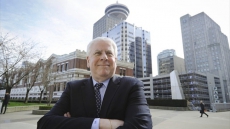OTTAWA — Canadian policy-makers can expect to come under intense pressure now that the United States and China have reached a ground-breaking agreement on curbing greenhouse gas emissions.
The deal, announced in Beijing, would double the annual rate at which the U.S. is reducing its emissions and, by 2025, cut emissions to 26 to 28 per cent below 2005 levels.
China, meanwhile, says 20 per cent of its energy will come from zero-emission sources by 2030, the year the country has promised its greenhouse gas emissions will peak. It's the first time China has agreed to cap emissions.
The Conservative government in Ottawa has long argued that curbing Canada's relatively paltry emissions on the global scale was not a priority when major emitters such as China were unwilling to act.
"That excuse of 'why should others do something when the two largest emitters in the world are not,' that argument is seriously undermined today," David McLaughlin, the former head of the federal Round Table on the Environment and Economy, said in an interview.
"It puts real pressure on Canada to up its climate game."
Regulation of the oil and gas sector has been promised — and delayed — for years, even as Canada falls well behind on its international commitment to cut emissions 17 per cent below 2005 levels by the year 2020. The Americans have the same 2020 target and were on track to meet it before President Barack Obama announced the new, more aggressive goal.
"The bedrock of Canadian climate policy is aligning and going in lockstep with the United States," said McLaughlin. "That only works when the United States is moving at a pace that we can keep up."
Now the U.S. is leaping ahead.
A spokesman for Environment Minister Leona Aglukkaq said Canada "is taking decisive action" on curbing emissions but did not dispute the country will miss its 2020 international commitment under the Copenhagen accord.
In 2012, the last year for which the government has data, emissions were 5.1 per cent below 2005 levels, Ted Laking said in an email.
"With respect to oil and gas regulations, this is a continental issue that needs a North American solution," said Laking. "We will continue to work with the United States on reducing GHG emissions for the oil and gas sector."
Environmental groups say Canada has run out of excuses and can no longer hold up the fig leaf of economic competitiveness with its dominant trading partner.
"This move by the world's two largest polluters takes away the Harper government's main excuse for their inaction on climate change," said Keith Stewart, Greenpeace Canada energy researcher.
"If our government continues to act as a cheerleader for the global oil industry, Canada risks being left behind politically and economically as the rest of the world steps up the fight against climate change by moving on to cleaner energy."
China's promise to move to a 20 per cent mix of zero-emissions energy is the economic hinge in the agreement, said Alex Wood of Sustainable Prosperity.
"When you're talking about building at the kind of scale anything involving China requires, there will be lots of money to be made by those with solutions to offer," Wood said in interview.
"It's basically going to turbocharge the whole clean-energy sector. Where are we on that? We're not part of that conversation."
The China-U.S. deal comes the same day the International Energy Agency released its annual World Energy Outlook.
The report noted that global fossil fuel subsidies totalled about $550 billion in 2013, while subsidies for renewables hit $120 billion.
It projects global oil demand will peak by 2040 and that there will be huge demand for renewables that will be difficult to meet.
"A well-supplied oil market in the short-term should not disguise the challenges that lie ahead, as the world is set to rely more heavily on a relatively small number of producing countries," said IEA chief economist Fatih Birol.
And that reality, for a Canadian prime minister whose political base is in the oil-producing West, explains the differing rhetoric between Harper and Obama.
"It shows what's possible when we work together on an urgent global challenge," Obama said of the China agreement Wednesday in Beijing.
Harper, during a visit to Ottawa by Australian Prime Minister Tony Abbot in June, struck a far different tone.
"No country is going to undertake action on climate, no matter what they say, no country is going to take actions that are going to deliberately destroy jobs and growth in their country," said Harper.
"We are just a little more frank about that, but that is the approach that every country is seeking."





